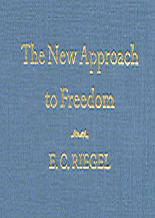 Home Page
Home Page Open PDF Version
Open PDF Version Purchase Hardcopy
Purchase Hardcopy
 THE NEW APPROACH TO FREEDOM
THE NEW APPROACH TO FREEDOMTogether with Essays on the Seperation of Money and State by E. C. Riegel Edited by Spencer Heath MacCallum THE HEATHER FOUNDATION
Copyright © 2003 The Heather Foundation |
||
|
||
|
WRITING to Thomas Jefferson in 1787, John Adams said, "All the perplexities, confusion and distress in America arise from downright ignorance of the nature of coin, credit and circulation." Downright ignorance is the proper term, and it still abides with us. It applies to our academies, our counting houses, our legislatures, and the man in the street. We do not know what money is, what its virtues or vices spring from, what are the natural laws governing it, nor its influence in determining the trend of a people toward democracy or dictatorship. Two forces are now pressing for its solution. One is the increasing specialization of labor, which requires man to make more exchanges in ratio as he reduces his self-sufficiency. In other words, the more man reduces his part in the production of the whole product, the more exchanges are necessary and hence the greater use of money. The other force making the solution of the money problem imperative is the growth of dictatorship and the contraction of democracy in ratio as governments exert the money issuing power. Herbert Spencer, writing in Social Statics, said:
And further:
In Spencer's day, the specialization of labor and the need of free monetary exchanges had not been so highly developed as in our day. His challenge to government money power therefore passed unnoticed. But we must heed it now. Let us dare to question the propriety of government money power—and let us speculate on "what would result if it were abolished.” Another Englishman, Arthur Kitson, writing in 1894 in A Scientific Solution of the Money Question, said:
Is it true that, in the language of Spencer, "to forbid the issue, or enforce the receipt of certain notes or coin is to infringe the right of exchange?" And is it further true that, in the words of Kitson, "there is no good reason why communities should not create and control their own currency?" Freedom of exchange is now so imperative, and centralization of political power so threatening, that it behooves us to inquire whether our economic and political ills and the threat to peace are not due to misplacement of money power in the state—and whether and how that power might better be exercised by the people for progress, prosperity and peace. |
||